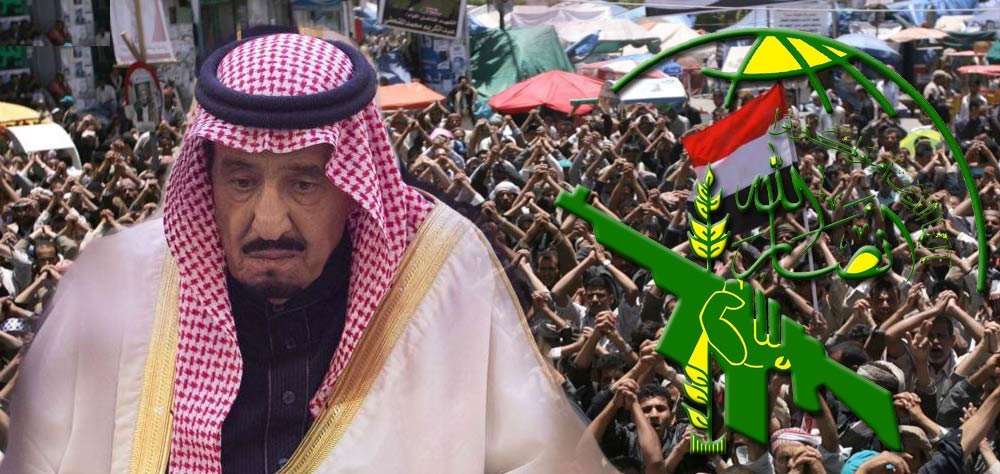(AhlulBayt News Agency) - The Saudi Arabian aggression against Yemen in March 2015 came with the intention of introducing political changes to Yemen according to the will of Riyadh. Mohammed bin Salman, the Saudi deputy crown prince and the defense minister, was optimistic that with reliance to the weaponry supremacy as well as the US intelligence backing, the kingdom could do the job of returning to power the pro-Saudi Abdrabbuh Mansur Hadi, the resigned president of Yemen.
The young prince hoped to seize the opportunity to boost his place in the pyramid of power of the country topped by his father King Salman. But the resistance of the revolutionary Ansarullah movement and its allies including the former Yemeni President Ali Abdullah Saleh has changed the equations in Yemen’s conflict. The lingered war beside raising the tolls of the Saudi military forces as well as some other Arab countries has drawn reactions from the public opinion, pushing the UN to add name of Saudi Arabia to the list of violators of the children rights, though later under pressures from Mohammed bin Salman on Ban Ki-moon, the secretary general of the UN, Riyadh’s name was eliminated from the UN’s blacklist to block any international body's punitive moves against the kingdom.
The daily $200 million cost of the Saudi war on Yemen as well as budget deficit and unavoidable austerity measures on the one hand and the US concerns about being blacklisted as a violator of the human rights made the Saudi leaders consider ways to put an end to the nearly two-year conflict through dialogue.
So, the intra-Yemeni peace talks started late April this year, hosted by Kuwait. On the one side stood the “Sana’a delegation” led by Ansarullah and pro-Saleh groups. On the other side was “Saudi Arabia delegation” led by negotiators from the resigned government of Yemen led by Mansur Hadi.
The negotiations lasted in a period of 90 days without any results because every time Saudi Arabia launched airstrikes, breaching the ceasefire deal agreed upon by the Yemeni warring sides. Actually, it was hard for Saudi leaders to accede to the demands of Ansarullah. The Saudis were hopeful that they take advantage of the war conditions in the battleground to deal the ultimate blow to the resistant Yemeni movement. But every time they only had to see their failures worse than before and so sustain heavy political and military pressures.
Ansarullah, a majorly Zaydi Shiite movement, just before the Saudi Arabian anti-Yemeni campaign was in the political and governing margins. But resistance to the Saudi-led aggressors, its plans for forming public defense committees, reaching political agreement with Ali Abdullah Saleh, and thus forming alliance with him transformed the movement into a leading actor on the ground, and today almost no group or figure can shape the new Yemeni political structures without observing its demands.
During the peace dialogue, Ansarullah tried to keep the power in the hands of the Yemen’s revolutionary forces, and not to let it fall in the hands of pro-Saudi groups. On the opposite side, Riyadh insisted on reinstating the resigned president Mansur Hadi in power, and demanded that Ansarullah implements the UN resolution and disarm. But the differences and deep gaps between the two sides' demands and views dampened the existing chances for finding a peaceful settlement for the crisis.
Meanwhile, what can be a trump card for the Ansarullah-led revolutionary forces of Yemen is the popular support and company, despite over a year of war and strikes the people suffered during the conflict. Besides, the revolutionary forces' holding of the capital, Bab-el-Mandeb Strait, the financial and security institutions, and strong leadership of Ansarullah in siege conditions and in a time that their friends cannot send their aids to then, people’s trust to the movement's potentials for management of the country’s affairs saw a rise.
On the opposite side, Saudi Arabia counts on the silence of the international community and the UN and supports from Washington. This international inaction helped the Saudi leaders continue their illegal war that according to the international law could provoke a global action against Riyadh. The war has so far left over 10,000 Yemen civilians dead.
But, although the Saudi aggressive actions under periodic truces inflicted huge amount of financial and human damages on Yemen, Riyadh so far failed to actualize any of its goals as it faces firm resistance of the Yemeni revolutionaries. Even worse, it appears that increasing human and financial prices of the war on the one hand and shift in the US foreign policy in West Asia region on the other hand press Saudi Arabia even deeper in Yemen quagmire.
/129
source : Al Waqat
Saturday
10 December 2016
10:41:00 AM
797237

The daily $200 million cost of the Saudi war on Yemen as well as budget deficit and unavoidable austerity measures on the one hand and the US concerns about being blacklisted as a violator of the human rights made the Saudi leaders consider ways to put an end to the nearly two-year conflict through dialogue.
